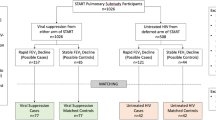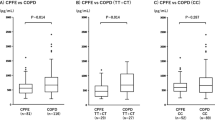Abstract
Infection frequently causes exacerbations of chronic obstructive pulmonary disease (COPD). Mannose-binding lectin (MBL) is a pattern-recognition receptor that assists in clearing microorganisms. Polymorphisms in the MBL2 gene reduce serum MBL levels and are associated with risk of infection. We studied whether the MBL2 codon 54 B allele affected serum MBL levels, admissions for infective exacerbation in COPD and disease susceptibility. Polymorphism frequency was determined by PCR-RFLP in 200 COPD patients and 104 smokers with normal lung function. Serum MBL was measured as mannan-binding activity in a subgroup of 82 stable COPD patients. Frequency of COPD admissions for infective exacerbation was ascertained for a 2-year period. The MBL2 codon 54 B allele reduced serum MBL in COPD patients. In keeping, patients carrying the low MBL-producing B allele had increased risk of admission for infective exacerbation (OR 4.9, Pcorrected=0.011). No association of MBL2 genotype with susceptibility to COPD was detected. In COPD, serum MBL is regulated by polymorphism at codon 54 in its encoding gene. Low MBL-producing genotypes were associated with more frequent admissions to hospital with respiratory infection, suggesting that the MBL2 gene is disease-modifying in COPD. MBL2 genotype should be explored prospectively as a prognostic marker for infection risk in COPD.
This is a preview of subscription content, access via your institution
Access options
Subscribe to this journal
Receive 6 digital issues and online access to articles
$119.00 per year
only $19.83 per issue
Buy this article
- Purchase on Springer Link
- Instant access to full article PDF
Prices may be subject to local taxes which are calculated during checkout
Similar content being viewed by others
References
American Thoracic Society. Standards for the diagnosis and care of patients with chronic obstructive pulmonary disease. Am J Respir Crit Care Med 1995; 152 (5 Part 2): S77–S121.
Pauwels RA, Buist AS, Calverley PM, Jenkins CR, Hurd SS . Global strategy for the diagnosis, management, and prevention of chronic obstructive pulmonary disease. NHLBI/WHO global initiative for chronic obstructive lung disease (GOLD) workshop summary. Am J Respir Crit Care Med 2001; 163: 1256–1276.
Wilson R . Bacteria, antibiotics and COPD. Eur Respir J 2001; 17: 995–1007.
Sethi S . Bacterial infection and the pathogenesis of COPD. Chest 2000; 117(5 Suppl 1): 286S–291S.
Kanner RE, Anthonisen NR, Connett JE . Lower respiratory illnesses promote FEV1 decline in current smokers but not ex-smokers with mild chronic obstructive pulmonary disease. Results from the Lung Health Study. Am J Respir Crit Care Med 2001; 164: 358–364.
Medzhitov R, Janeway Jr C, Innate immunity. N Engl J Med 2000; 343: 338–344.
Turner MW . Mannose-binding lectin (MBL) in health and disease. Immunobiology 1998; 199: 327–339.
Neth O, Jack DL, Dodds AW, Holzel H, Klein NJ, Turner MW . Mannose-binding lectin binds to a range of clinically relevant microorganisms and promotes complement deposition. Infect Immun 2000; 68: 688–693.
Steffensen R, Thiel S, Varming K, Jersild C, Jensenius JC . Detection of structural gene mutations and promoter polymorphisms in the mannan-binding lectin (MBL) gene by polymerase chain reaction with sequence-specific primers. J Immunol Methods 2000; 241: 33–42.
Crosdale DJ, Ollier WE, Thomson W et al. Mannose binding lectin (MBL) genotype distributions with relation to serum levels in UK Caucasoids. Eur J Immunogenet 2000; 27: 111–117.
Koch A, Melbye M, Sorensen P et al. Acute respiratory tract infections and mannose-binding lectin insufficiency during early childhood. JAMA 2001; 285: 1316–1321.
Garred P, Madsen HO, Halberg P et al. Mannose-binding lectin polymorphisms and susceptibility to infection in systemic lupus erythematosus. Arthritis Rheum 1999; 42: 2145–2152.
Roy S, Knox K, Segal S et al. MBL genotype and risk of invasive pneumococcal disease: a case–control study. Lancet 2002; 359: 1569–1573.
Neth O, Hann I, Turner MW, Klein NJ . Deficiency of mannose-binding lectin and burden of infection in children with malignancy: a prospective study. Lancet 2001; 358: 614–618.
Garred P, Pressler T, Madsen HO et al. Association of mannose-binding lectin gene heterogeneity with severity of lung disease and survival in cystic fibrosis. J Clin Invest 1999; 104: 431–437.
Gabolde M, Guilloud-Bataille M, Feingold J, Besmond C . Association of variant alleles of mannose binding lectin with severity of pulmonary disease in cystic fibrosis: cohort study. BMJ 1999; 319: 1166–1167.
Wedzicha JA . Airway infection accelerates decline of lung function in chronic obstructive pulmonary disease. Am J Respir Crit Care Med 2001; 164(10 Part 1): 1757–1758.
MacNee W . Airway infection does not accelerate decline in lung function in chronic obstructive pulmonary disease. Am J Respir Crit Care Med 2001; 164(10 Part 1): 1758–1760.
Madsen HO, Garred P, Kurtzhals JA et al. A new frequent allele is the missing link in the structural polymorphism of the human mannan-binding protein. Immunogenetics 1994; 40: 37–44.
Madsen HO, Garred P, Thiel S et al. Interplay between promoter and structural gene variants control basal serum level of mannan-binding protein. J Immunol 1995; 155: 3013–3020.
Petersen SV, Thiel S, Jensenius JC . The mannan-binding lectin pathway of complement activation: biology and disease association. Mol Immunol 2001; 38: 133–149.
Joost O, Wilk JB, Cupples LA et al. Genetic loci influencing lung function: a genome-wide scan in the Framingham Study. Am J Respir Crit Care Med 2002; 165: 795–799.
Silverman EK, Palmer LJ, Mosley JD et al. Genomewide linkage analysis of quantitative spirometric phenotypes in severe early-onset chronic obstructive pulmonary disease. Am J Hum Genet 2002; 70: 1229–1239.
Ezekowitz RAB . Mannose-binding lectin in prediction of susceptibility to infection. Lancet 2001; 358: 598–599.
Valdimarsson H, Stefansson M, Vikingsdottir T et al. Reconstitution of opsonizing activity by infusion of mannan-binding lectin (MBL) to MBL-deficient humans. Scand J Immunol 1998; 48: 116–123.
Garred P, Pressler T, Lanng S et al. Mannose-binding lectin (MBL) therapy in an MBL-deficient patient with severe cystic fibrosis lung disease. Pediatr Pulmonol 2002; 33: 201–207.
American Thoracic Society. Standardization of Spirometry, 1994 Update. Am J Respir Crit Care Med 1995; 152: 1107–1136.
Morris JF, Koski A, Johnson LC . Spirometric standards for healthy nonsmoking adults. Am Rev Respir Dis 1971; 103: 57–67.
Lipscombe RJ, Sumiya M, Hill AV et al. High frequencies in African and non-African populations of independent mutations in the mannose binding protein gene. Hum Mol Genet 1992; 1: 709–715.
Christiansen OB, Kilpatrick DC, Souter V, Varming K, Thiel S, Jensenius JC . Mannan-binding lectin deficiency is associated with unexplained recurrent miscarriage. Scand J Immunol 1999; 49: 193–196.
Bland M . An Introduction to Medical Statistics, 3rd edn. Oxford University Press, Oxford, 2000.
Acknowledgements
We sincerely thank the patients and staff of The Prince Charles Hospital, the Respiratory Investigations Unit and Phlebotomy. This work was supported by The Prince Charles Hospital Foundation, an NHMRC Postgraduate Medical Scholarship (for IAY) and an NHMRC Project Grant No. 970283 (to EMA). Statistical advice was supported by an ARC SPIRT Grant No. C10024120.
Author information
Authors and Affiliations
Corresponding author
Rights and permissions
About this article
Cite this article
Yang, I., Seeney, S., Wolter, J. et al. Mannose-binding lectin gene polymorphism predicts hospital admissions for COPD infections. Genes Immun 4, 269–274 (2003). https://doi.org/10.1038/sj.gene.6363961
Published:
Issue Date:
DOI: https://doi.org/10.1038/sj.gene.6363961
Keywords
This article is cited by
-
Association of mannose binding lectin with chronic obstructive pulmonary disease susceptibility and its clinical outcomes
Molecular Biology Reports (2023)
-
Association of mannose-binding lectin, ficolin-2 and immunoglobulin concentrations with future exacerbations in patients with chronic obstructive pulmonary disease: secondary analysis of the randomized controlled REDUCE trial
Respiratory Research (2021)
-
Mannose-binding lectin protein and its association to clinical outcomes in COPD: a longitudinal study
Respiratory Research (2015)
-
Mechanisms and impact of the frequent exacerbator phenotype in chronic obstructive pulmonary disease
BMC Medicine (2013)
-
Loss of Siglec-14 reduces the risk of chronic obstructive pulmonary disease exacerbation
Cellular and Molecular Life Sciences (2013)



